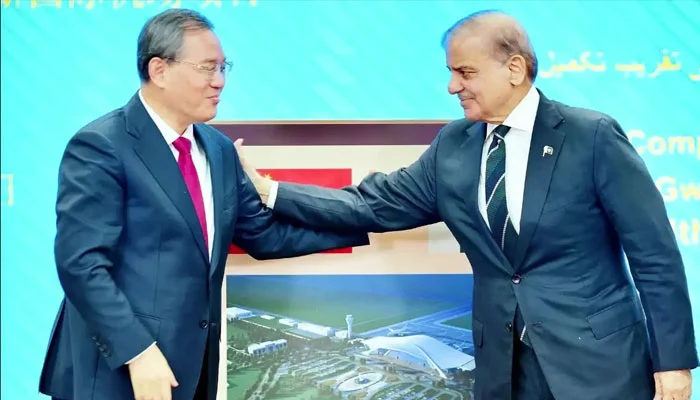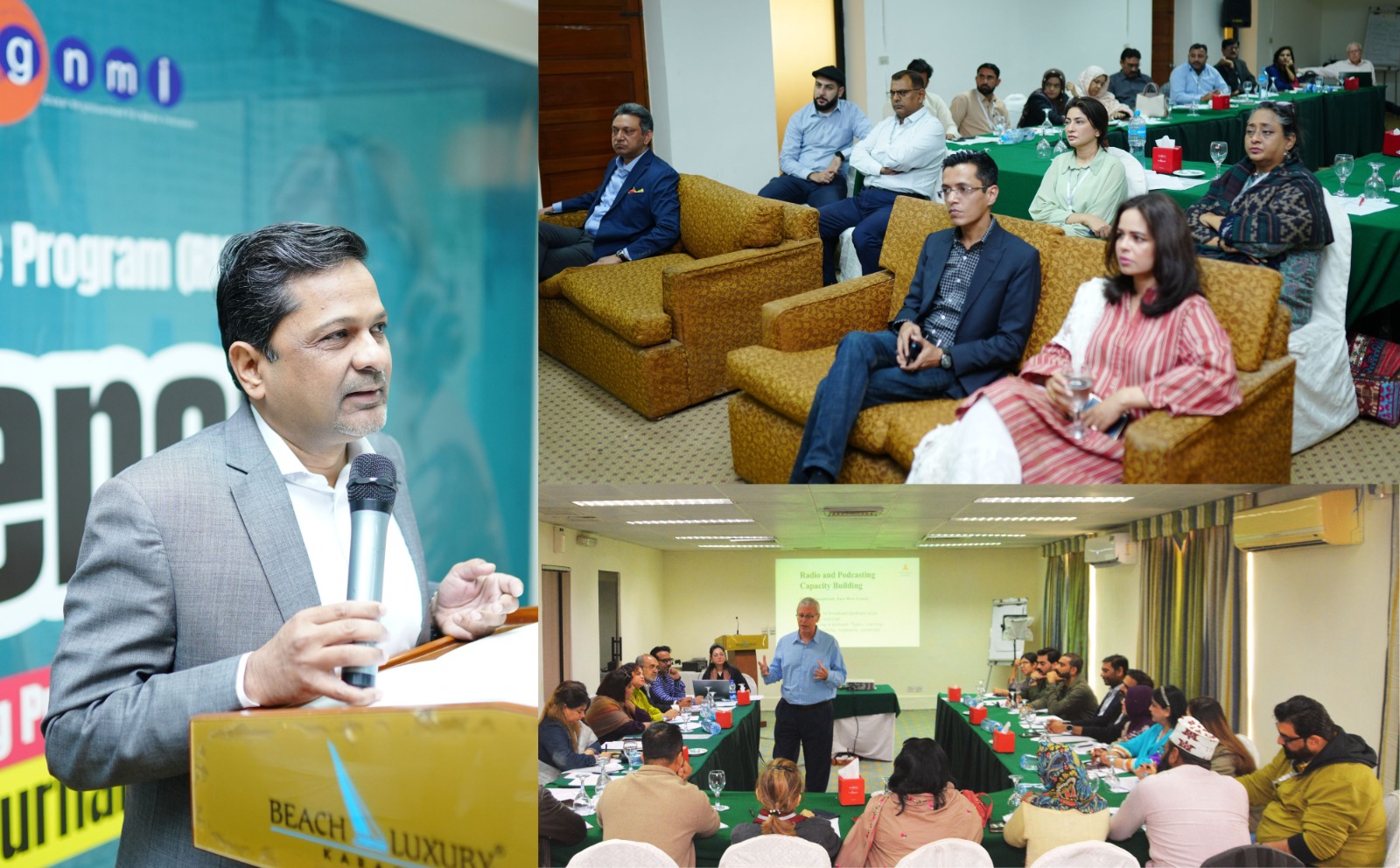Pakistan and China have signed 13 key agreements to enhance bilateral cooperation across sectors such as energy, infrastructure, agriculture, and defense.
The accords aim to boost collaboration under CPEC, including projects like the ML-1 railway and Gwadar International Airport. Both nations are committed to strengthening economic ties and strategic partnerships.
Pakistan and China expressed their satisfaction on Monday regarding their strategic cooperative partnership, which is based on trust and shared values.
The agreement was reached during a delegation-level meeting here between Chinese Premier Li Qiang and Prime Minister Shehbaz Sharif. The two sides reported that their partnership was getting stronger by the day, and the leaders talked about everything from bilateral relations to issues of mutual, regional, and international importance.
Reiterating their commitment to the high-quality development of the second phase of the China-Pakistan Economic Corridor (CPEC), both leaders reiterated their support for one another on all major issues. They additionally underscored the requirement for ideal fruition of all ongoingprojects in different areas, including industry, farming modernisation, data innovation, and science and innovation, for common advantage and Pakistan’s financial turn of events.
Pakistan’s unwavering commitment to protecting Chinese nationals and projects in Pakistan was reiterated by Prime Minister Shehbaz Sharif. Held the most productive conversations with Chinese Premier Li Qiang, “Shehbaz Sharif stated on his social media site “X.”
He stated that they agreed to ensure their prompt execution and expressed satisfaction with the progress of various important CPEC initiatives. The PM said they also talked about ways to improve cooperation in a number of other areas, like trade, investment, the economy, energy, agriculture, information technology, defense, and regional peace and security. The PM stated, “The cornerstone of regional stability and prosperity is our strategic partnership and complete comprehension of our core issues.”
He said that they oversaw the new Gwadar airport’s completion and witnessed the exchange of significant memoranda of understanding that will improve cooperation in a variety of areas. Long Live Pak-China fellowship,” Shehbaz Sharif closed.
High-level exchanges between the two leaders will continue, with the goal of strengthening cooperation in all areas. The meeting exchanged ideas on how to increase Chinese investment in Pakistan and the relocation of Chinese industries to Pakistan.
During the meeting, it was reiterated that Pakistan and China will continue to closely consult on regional and global issues as well as at multilateral forums. In the meantime, the brand-new Gwadar International Airport was almost officially opened by Chinese Premier Li Qiang and Prime Minister Shehbaz Sharif.
Tending to debut service, Head of the state Shehbaz Sharif expressed finish of Gwadar Worldwide Air terminal was a gift from China. He said it shows China’s responsibility and commitment to help Pakistan’s monetary improvement plan and to advance in reverse areas of country.
He communicated the certainty that culmination of this global Gwadar air terminal wouldn’t just change Gwadar’s economy, yet additionally economy of the country. Shehbaz expressed his gratitude to the leadership of China and praised Pakistan’s and China’s unwavering efforts to construct a world-class airport in Gwadar.
He said a marking service and trade of MoUs among Pakistan and China in different fields, including industry, farming and business was seen by top state leaders of the two nations. The PM expressed optimism that the MoUs would soon develop into agreements through collaborative efforts on the part of both nations.
According to Chinese Premier Li Qiang, Pakistan and China would continue to collaborate in accordance with the concept of planning, building, and benefiting from one another. He stated that the development of the New Gwadar International Airport into a regional connectivity hub in Gwadar is a crucial step. He went on to say that workers from China and Pakistan built this modern, high-quality airport in five years, demonstrating the strength of cooperation between China and Pakistan.
The Chinese premier expressed optimism that the opening of the New Gwadar International Airport would significantly improve Gwadar’s connectivity. The Chinese state head guaranteed that Beijing would keep on working intimately with the private Pakistani companions in building and helping together by chasing after the objectives of exclusive expectations, maintainability and excellent of Belt and Street Drive.
Li Qiang referred to the ties between China and Pakistan as a “special relationship and friendship,” stating that this all-weather strategic partnership was expanding. He continued, “The unique and unbreakable time-tested ironclad friendship stood the changing global landscape.”
On Monday, Pakistan’s military leadership met with visiting Chinese Prime Minister Li Qiang here. With the Chairman of the Joint Chiefs of Staff Committee and three chiefs of services, the Chinese premier held an important meeting. The meeting demonstrated the determination to further develop and broaden relations between the two nations. The threat posed by terrorism and defense were also topics of discussion.
The Chinese PM commended job of Pakistan’s military against psychological oppression and his nation’s full help and help with this conflict. Earlier on Monday, Pakistan and China signed 13 memorandums of understanding (MoUs) to improve cooperation. These MoUs include the renewal of the currency swaps agreement and the signing of the protocol on quarantine requirements for donkey meat exports to China.
During the Chinese premier’s official visit to Pakistan, neither side entered into a memorandum of understanding (MoU) regarding the re-profiling of the $15.4 billion in Chinese IPP debt. Nonetheless, Pastor for Money Mohammad Aurangzeb when asked by The News said the profiling of Chinese IPPs obligation was work underway.
According to Minister of Planning Ahsan Iqbal, Pakistan and China have agreed to begin construction of the Mainline-1 (ML-1) with China providing financing for the first phase, which will run from Karachi to Hyderabad. He stated that the financing agreement for ML-1 would be completed once both parties agreed to develop modalities in the coming months.
The China International Development Cooperation Agency (CIDCA) and Ministry of Economic Affairs reached by the leaders of the two countries will keep a security environment for development. Pakistan and China signed a memorandum of understanding to strengthen security cooperation. Both parties agreed to maintain a peaceful and secure environment for development, which is a crucial guarantee for expanding cooperation in development. Additionally, they agreed to expand cooperation in counterterrorism and security. To support Pakistan’s economic and social development as well as national security, the CIDCA is willing to provide six bulletproof vehicles.
In order to promptly discuss and resolve pertinent issues through consultation, both parties will maintain communication on related specific matters. China and Pakistan agreed to collaborate on television production. The goal of the agreement between Pakistan and China is to encourage television co-productions in order to encourage cultural exchanges. By meeting the technical and creative requirements set by both nations, the collaboration makes it possible to produce television content that will aid in the development of cultural understanding and cooperation. The significance of this agreement in bringing the cultural narratives of both countries to a wider audience and strengthening bilateral ties should be highlighted by the media. A letter of exchange emphasized China’s commitment to provide Pakistan with 19 fire trucks, a multi-purpose rescue vehicle, and a rescue excavator for the fire and rescue vehicles project. It would altogether support Pakistan’s crisis reaction capacities, explicitly for fire and salvage administrations in Islamabad.
Data and Correspondence Collaboration: The MoU centers around improving advanced foundation, advancing ventures, for example, cloud administrations, savvy homerooms, and environmentally friendly power energy answers for advanced education. This is critical to Pakistan’s digital transformation and global competitiveness.
Increasing Livelihood Collaboration: This MoU fortifies social and occupation projects under the China-Pakistan Financial Hall (CPEC), zeroing in on horticulture, medical services, and professional preparation. It contributes to Pakistan’s socioeconomic development and is in line with the Belt and Road Initiative’s (BRI) broader regional objectives.
Establishment of Joint Labs: The establishment of joint laboratories focusing on hydropower technology and disaster prevention is made easier by this MoU. Pakistan’s capabilities in disaster management and rural electrification will be enhanced by the joint research and technology transfer.
Disaster Mitigation and Water Conservation: Pakistan’s requirements for flood control and disaster recovery are the focus of this MoU. It incorporates drives like waterway preparing and flood anticipation, which are essential for moderating fiasco influences in weak locales.
Additionally, the minutes of the 13th CPEC Joint Cooperation Committee meeting and the 7th CEPC Joint Working Group on Gwadar were handed over. Prior in the day, the Chinese head arrived in Islamabad on four-day official visit in front of the Shanghai Participation Association (SCO) culmination.
APP adds Prime Minister Shehbaz Sharif warmly welcomed Premier Li at the formal welcome ceremony, where he was presented with a guard of honor prior to the meeting and delegation-level talks.
FAQs:
- What recent agreements have been signed between Pakistan and China?
- Pakistan and China signed 13 agreements to enhance cooperation in areas such as energy, infrastructure, agriculture, and defense.
- What is the significance of the ML-1 project?
- The ML-1 railway project aims to improve connectivity and transport efficiency between major cities in Pakistan, forming a crucial part of the China-Pakistan Economic Corridor (CPEC).
- How will these accords impact economic relations between the two countries?
- The agreements are expected to strengthen bilateral trade and investment, enhancing Pakistan’s economic development through Chinese support.
- What sectors will benefit from the Pakistan-China cooperation?
- Key sectors include energy, infrastructure, IT, agriculture, and defense, promoting comprehensive growth and development.
- How does the Gwadar International Airport fit into this cooperation?
- The airport project is a significant infrastructure development aimed at facilitating trade and transportation in the region, enhancing connectivity under CPEC.





![Infinix Note 40 Price in Pakistan – Full Specs, Features & Reviews [2025]](https://mubashartechtalk.com/wp-content/uploads/2025/07/Infinix-Note-40-price-in-pakistan-2025-150x150.jpg)




